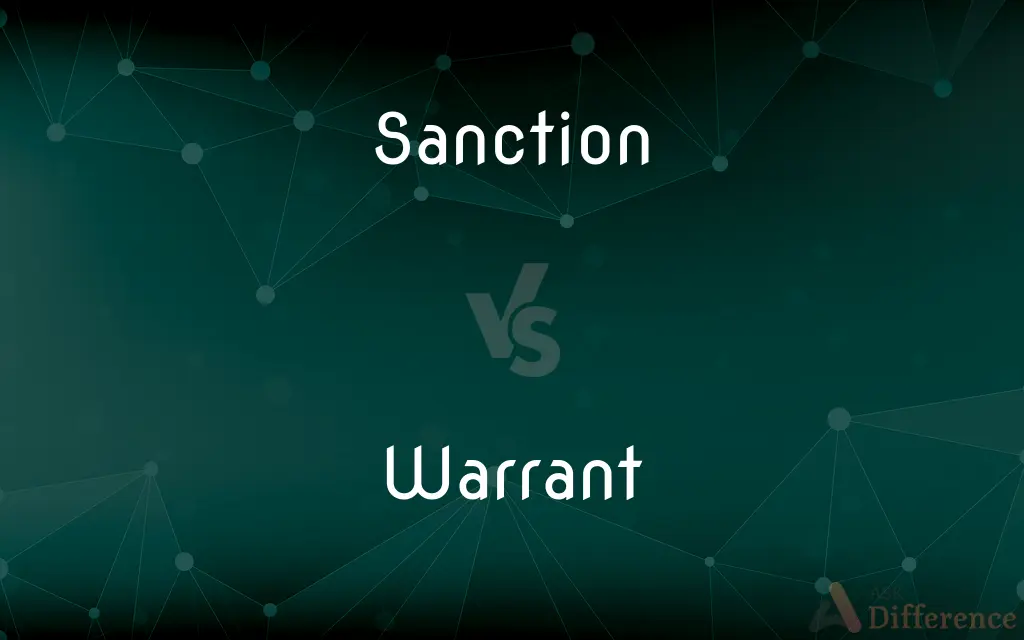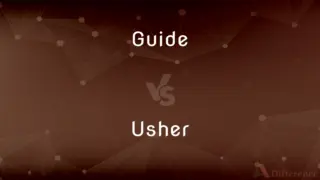Sanction vs. Warrant — What's the Difference?
Edited by Tayyaba Rehman — By Urooj Arif — Updated on April 15, 2024
Sanction can mean a penalty for breaking a law or a formal approval, e.g., "UN sanctions against the country," whereas warrant is a legal document authorizing action, e.g., "A search warrant was issued."

Difference Between Sanction and Warrant
Table of Contents
ADVERTISEMENT
Key Differences
Sanction refers to either a penalty imposed to enforce laws or an official approval for an action. For instance, economic sanctions punish countries for certain behaviors. On the other hand, a warrant is specifically a legal authorization issued by a court or other legal authority allowing police or other officials to carry out a particular action, such as conducting a search.
Sanctions are used broadly in international and domestic policy to influence behavior and ensure compliance with laws or regulations. They can be economic, sports-related, or diplomatic. Whereas, warrants are used within the judicial system to ensure that certain actions, like arrests or searches, are conducted legally, based on probable cause or sufficient evidence.
The purpose of sanctions can be both punitive and preventative, aiming to deter undesirable actions or policies by states or individuals. Conversely, warrants primarily serve to protect individual rights by limiting the conditions under which authorities are permitted to infringe on privacy or liberty.
Sanctions can be issued by international bodies, national governments, or even private institutions, depending on the context. For example, a sports organization might sanction a player for misconduct. Warrants, however, are strictly issued by a legal authority and are usually specific to the legal systems of particular countries.
Sanctions may involve complex legal frameworks and international negotiations and can vary widely in their scope and implementation. Warrants are more straightforward in their legal basis and execution, focusing solely on law enforcement and legal proceedings.
ADVERTISEMENT
Comparison Chart
Definition
A penalty or approval.
A legal document authorizing action.
Usage Contexts
International law, sports, policies.
Law enforcement, legal proceedings.
Purpose
To punish, deter, or approve.
To authorize and ensure legality.
Issued By
Governments, international bodies, organizations.
Courts or similar legal authorities.
Types
Economic, diplomatic, sports-related.
Arrest, search, bench.
Compare with Definitions
Sanction
Official permission or approval for an action.
The project received sanctions from the government.
Warrant
An official document entitling the holder to receive or do something.
The military officer had a warrant for his promotion.
Sanction
A threatened penalty for disobeying a law or rule.
Economic sanctions were placed on the nation.
Warrant
A financial security that entitles the holder to buy stock of the issuing company at a specified price, usually higher than the market price at the time of issue.
The investor purchased a stock warrant.
Sanction
Something that gives binding force to a law.
Legal sanctions ensure adherence to environmental standards.
Warrant
Something that serves as a guarantee, assurance, or promise.
The product comes with a warranty that serves as a warrant for its quality.
Sanction
Actions taken by one or more countries against another judged to be violating international law.
The UN imposed sanctions on the country.
Warrant
A document issued by a legal or government official authorizing the police or some other body to make an arrest, search premises, or carry out some other action relating to the administration of justice.
The judge issued a search warrant for the premises.
Sanction
Measures taken by a sports body against a participant for breaking rules.
The athlete faced sanctions for doping.
Warrant
Justification or authority for an action, belief, or feeling.
There is no warrant for this accusation.
Sanction
Authoritative permission or approval that makes a course of action valid.
Warrant
A document issued by a legal or government official authorizing the police or another body to make an arrest, search premises, or carry out some other action relating to the administration of justice
An extradition warrant
Magistrates issued a warrant for his arrest
Sanction
Support or encouragement, as from public opinion or established custom.
Warrant
Justification or authority for an action, belief, or feeling
There is no warrant for this assumption
Sanction
A consideration, influence, or principle that dictates an ethical choice.
Warrant
An official certificate of appointment issued to an officer of lower rank than a commissioned officer.
Sanction
The penalty for noncompliance with a law or legal order.
Warrant
Justify or necessitate (a course of action)
The employees feel that industrial action is warranted
Sanction
A penalty, specified or in the form of moral pressure, that acts to ensure compliance with a social standard or norm.
Warrant
Officially affirm or guarantee
The vendor warrants the accuracy of the report
Sanction
A coercive measure adopted usually by several nations acting together against a nation violating international law.
Warrant
(Law) A judicial writ authorizing the search or seizure of property, arrest of a person, or the execution of a legal judgment.
Sanction
To give official authorization or approval to
Voting rights that are sanctioned by law.
Warrant
A voucher authorizing payment or receipt of money.
Sanction
To encourage or tolerate by indicating approval
His colleagues sanctioned his new research.
Warrant
An option to buy stock at a specified price from an issuing company.
Sanction
To penalize, as for violating a moral principle or international law
"Half of the public defenders of accused murderers were sanctioned by the Texas bar for legal misbehavior or incompetence" (Garry Wills).
Warrant
Justification for an action or a belief; grounds
"The difficulty of predicting the future is no warrant to ignore it" (Brian Hayes).
Sanction
An approval, by an authority, generally one that makes something valid.
The whalers had been operating in the contested waters off the island with sanction from the Japanese government.
Warrant
Something that provides assurance or confirmation; a guarantee or proof
"The kind of uncertainties and ambiguities ... which may damage [his] essays ... are often a warrant of authenticity in [his] fiction" (John Edward Hardy).
Sanction
A penalty, punishment, or some coercive measure, intended to ensure compliance; especially one adopted by several nations, or by an international body.
The United States enacted a new round of sanctions against the apartheid regime of South Africa.
Warrant
Authorization or certification; sanction, as given by a superior.
Sanction
A law, treaty, or contract, or a clause within a law, treaty, or contract, specifying any of the above.
Warrant
A warrant officer.
Sanction
(transitive) To ratify; to make valid.
Warrant
A certificate of appointment given to a warrant officer.
Sanction
(transitive) To give official authorization or approval to; to countenance.
Warrant
To provide adequate grounds for; justify or require
What could he have done that would warrant such a punishment?.
Sanction
(transitive) To penalize (a state etc.) with sanctions.
Warrant
To guarantee (a product).
Sanction
Solemn or ceremonious ratification; an official act of a superior by which he ratifies and gives validity to the act of some other person or body; establishment or furtherance of anything by giving authority to it; confirmation; approbation.
The strictest professors of reason have added the sanction of their testimony.
Warrant
To guarantee (a purchaser) indemnification against damage or loss.
Sanction
Anything done or said to enforce the will, law, or authority of another; as, legal sanctions.
Warrant
(Law) To guarantee clear title to (real property).
Sanction
To give sanction to; to ratify; to confirm; to approve.
Would have counseled, or even sanctioned, such perilous experiments.
Warrant
Authorization or certification; a sanction, as given by a superior.
Sanction
Formal and explicit approval;
A Democrat usually gets the union's endorsement
Warrant
(countable) Something that provides assurance or confirmation; a guarantee or proof.
A warrant of authenticity; a warrant for success
Sanction
A mechanism of social control for enforcing a society's standards
Warrant
(countable) An order that serves as authorization; especially a voucher authorizing payment or receipt of money.
Sanction
Official permission or approval;
Authority for the program was renewed several times
Warrant
An option, usually issued together with another security and with a term at issue greater than a year, to buy other securities of the issuer.
Sanction
The act of final authorization;
It had the sanction of the church
Warrant
A judicial writ authorizing an officer to make a search, seizure, or arrest, or to execute a judgment.
An arrest warrant issued by the court
Sanction
Give sanction to;
I approve of his educational policies
Warrant
(countable) A certificate of appointment given to a warrant officer.
Sanction
Give authority or permission to
Warrant
A document certifying that a motor vehicle meets certain standards of mechanical soundness and safety; a warrant of fitness.
Sanction
Give religious sanction to, such as through on oath;
Sanctify the marriage
Warrant
A defender, a protector.
Warrant
Underclay in a coal mine.
Warren earth
Warrant
To protect, keep safe (from danger).
Warrant
To give (someone) an assurance or guarantee (of something); also, with a double object: to guarantee (someone something).
Warrant
(transitive) To guarantee (something) to be (of a specified quality, value, etc.).
Warrant
(transitive) To guarantee as being true; (colloquially) to believe strongly.
That tree is going to fall, I’ll warrant.
Warrant
(transitive) To authorize; to give (someone) sanction or warrant (to do something).
I am warranted to search these premises fully.
Warrant
(transitive) To justify; to give grounds for.
Circumstances arose that warranted the use of lethal force.
Warrant
That which warrants or authorizes; a commission giving authority, or justifying the doing of anything; an act, instrument, or obligation, by which one person authorizes another to do something which he has not otherwise a right to do; an act or instrument investing one with a right or authority, and thus securing him from loss or damage; commission; authority.
Warrant
A writing which authorizes a person to receive money or other thing.
Warrant
That which vouches or insures for anything; guaranty; security.
I give thee warrant of thy place.
His worth is warrant for his welcome hither.
Warrant
A precept issued by a magistrate authorizing an officer to make an arrest, a seizure, or a search, or do other acts incident to the administration of justice.
Warrant
That which attests or proves; a voucher.
Warrant
An official certificate of appointment issued to an officer of lower rank than a commissioned officer. See Warrant officer, below.
Warrant
Right; legality; allowance.
Warrant
To make secure; to give assurance against harm; to guarantee safety to; to give authority or power to do, or forbear to do, anything by which the person authorized is secured, or saved harmless, from any loss or damage by his action.
That show I first my body to warrant.
I'll warrant him from drowning.
In a placeLess warranted than this, or less secure,I can not be.
Warrant
To support by authority or proof; to justify; to maintain; to sanction; as, reason warrants it.
True fortitude is seen in great exploits,That justice warrants, and that wisdom guides.
How little while it is since he went forth out of his study, - chewing a Hebrew text of Scripture in his mouth, I warrant.
Warrant
To give a warrant or warranty to; to assure as if by giving a warrant to.
[My neck is] as smooth as silk, I warrant ye.
Warrant
To secure to, as a grantee, an estate granted; to assure.
Warrant
A writ from a court commanding police to perform specified acts
Warrant
A type of security issued by a corporation (usually together with a bond or preferred stock) that gives the holder the right to purchase a certain amount of common stock at a stated price;
As a sweetener they offered warrants along with the fixed-income securities
Warrant
Formal and explicit approval;
A Democrat usually gets the union's endorsement
Warrant
A written assurance that some product or service will be provided or will meet certain specifications
Warrant
Stand behind and guarantee the quality, accuracy, or condition of;
The dealer warrants all the cars he sells
I warrant this information
Common Curiosities
What types of sanctions are commonly used in international relations?
Economic sanctions, diplomatic sanctions, and military sanctions are common in international relations.
What is needed to issue a warrant?
A warrant requires probable cause and must be issued by a judicial officer or magistrate.
Can sanctions be both positive and negative?
Yes, sanctions can be both punitive (negative) and encouraging (positive) as approvals or incentives.
How is a warrant important in legal procedures?
A warrant ensures that law enforcement actions are conducted within the bounds of the law, protecting citizens' rights.
What are the limitations of a search warrant?
A search warrant is limited to specific locations, times, and items detailed in the warrant document.
What distinguishes a bench warrant from other types of warrants?
A bench warrant is issued directly from the bench (judge) for failing to appear in court, unlike arrest warrants issued for probable criminal activity.
How do international bodies enforce sanctions?
International bodies like the UN enforce sanctions through member countries, which implement and adhere to agreed-upon penalties or restrictions.
Are sanctions always effective in changing a country's policies?
Sanctions are not always effective and can lead to unintended consequences, but they are a tool used to exert pressure without direct conflict.
Why might a company issue warrants?
Companies issue warrants to attract investment, allowing warrant holders to purchase stock at a set price in the future.
How do sanctions impact countries economically?
Sanctions can restrict trade, limit resources, and impose financial penalties, significantly impacting a country's economy.
What is the process for lifting sanctions?
Lifting sanctions typically involves diplomatic negotiations and verification that the sanctioned party has complied with stipulated conditions.
How does the public view the use of warrants and sanctions?
Public perception of warrants and sanctions can vary, generally seen as necessary for justice and international order but sometimes criticized for misuse or unintended harm.
What role do sanctions play in sports?
In sports, sanctions can penalize individuals or teams for rule violations, aiming to maintain fair play and integrity.
Can a warrant be contested or appealed?
Yes, warrants can be contested or appealed in court, particularly if the basis for issuing the warrant is deemed insufficient or unlawful.
What happens if someone violates a sanction?
Violating sanctions can lead to further penalties, increased restrictions, or legal actions depending on the context and the enforcing body.
Share Your Discovery

Previous Comparison
Guide vs. Usher
Next Comparison
Multigrade vs. MonogradeAuthor Spotlight
Written by
Urooj ArifUrooj is a skilled content writer at Ask Difference, known for her exceptional ability to simplify complex topics into engaging and informative content. With a passion for research and a flair for clear, concise writing, she consistently delivers articles that resonate with our diverse audience.
Edited by
Tayyaba RehmanTayyaba Rehman is a distinguished writer, currently serving as a primary contributor to askdifference.com. As a researcher in semantics and etymology, Tayyaba's passion for the complexity of languages and their distinctions has found a perfect home on the platform. Tayyaba delves into the intricacies of language, distinguishing between commonly confused words and phrases, thereby providing clarity for readers worldwide.














































